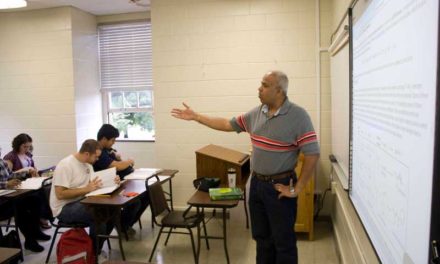By Evan Le’Mon, Shenandoah Lush and Kirsten Nguyen, The Whetstone
Former Director of Campus Life Carol King said she was “in disbelief†when comments concerning Student Affairs’ professionals’ weight were made by Dean of Students Wanda Anderson during a staff meeting last year.
“It actually happened on two separate occasions,†she said. “She said that President Clark had shared his concern with Dean Anderson about the hiring of large people and the image it presented for Student Affairs. It was blatant discrimination and disrespect.â€
Former Student Affairs Secretary Ashleigh Maser said the comments made her upset, as well as question how other staff members viewed her.
“I did a lot of research into protection for weight discrimination with the Equal Employment Opportunity Commission and the Department of Labor – there was none,†she said. “I felt helpless, so I decided to look for another job.â€
Maser also said Anderson made comments specifically targeted toward her.
“I was told that I couldn’t get away with wearing an outfit that two other employees that she named could wear,†Maser said. “There were a few times where I left her office after a one-on-one meeting in tears.â€
Anderson said she was asked by upper management about Student Affairs being healthy role models for the students.
“Any comments about our being healthy as a division came from that,†she said. “I’m overweight, we have several overweight staff members and we always have since I’ve been here. Weight has nothing to do with one’s ability to do their job.â€
Anderson said that an investigation from Wesley’s Human Resources department last semester found her not liable for any discrimination. She said she believes there is an agenda behind such allegations.
“There is a disgruntled former staff member that would like to believe that that’s my position,†she said. “I think they’re just trying to come at me with whatever they can, and they couldn’t find anything else.â€

This was only one of several issues that came up after the departure of several Student Affairs professionals. Those who left included the Director of Residence Life (Melissa Elliot), Assistant Director of Residence Life ILaura Blazewicz), the Director of Campus Life (Carol King), two Area Coordinators (Jacqui Rogers and John Caldora), the Student Affairs Secretary (Ashleigh Maser) and the Director of the Wellness Center (Jill Maser).
Anderson said that such movement within a Student Affairs department is normal.
“According to research, the average lifespan for entry level professionals in Student Affairs at any college is one to three years,†she said. “That’s unless they move up at the college into a different department, like Mark Berry did.â€
Former Area Coordinator of North Campus Mark Berry was promoted to Director of Campus Life after the departure of King.
“It’s been a learning experience,†he said. “My transition was a little difficult because I was originally promoted to Assistant Director of Residence Life and was still learning that position when I got promoted again.â€
Berry said he’s also used to things coming a little easier at his previous institution.
“I’m getting the hang of it, though,†he said. “Working here is teaching me how to fight and advocate for things.â€
Anderson said that retention of Student Affairs professionals is difficult because of the nature of the job.
“It’s not for the faint of heart,†she said. “Our department is in loco parentis, which means ‘in place of the parent’, so we’re plugged in 24/7. Most of the things we deal with are crisis-driven, so that’s part of what makes it so exhausting.â€
Director of Counseling Services Ann Rogge said she believed there is a lot more than what meets the eye when it comes to Student Affairs.
“There are lots of late nights, lots of weekends, lots of conduct cases, and lots of pressure that is experienced among our staff that the rest of the campus wouldn’t see. It’s a demanding job, and people get burned out.â€
Anderson said that improving living conditions for professionals may help ensure that they feel valued at Wesley and encourage them to stay longer.
“When I worked at the University of Delaware, the campus apartment they gave me confirmed that they valued me,†she said. “I also think we all could use a more competitive salary, as well as giving our staff more resources to do their jobs and create space to give them more time away from campus. They need a balance between their work life and their personal life.â€
Maser also said that the salary Wesley offered wasn’t sufficient.
“Our benefits were great, but the pay was a lot lower than it is for the same role at other colleges of the same size,†she said. “We also weren’t given time and a half pay for any extra hours.â€
Rogge agreed.
“The salaries aren’t great, so when you combine the demands of the job, and the financial compensation, it makes sense to leave.â€
Pastor B.K. Mullen, who was hired as chaplain last year, shares an adjoining office with Student Affairs. She said that the toll of the Student Affairs positions are evident in her interactions with the office.
“I’m on the other side of the office wall, but there are lots of tension and stress over there,†she said. “People have said things to me [about the stress], and while I am kind of detached, you can certainly feel it.â€
Anderson said that she tries to do things to boost morale within the office.
“I’ll take them all bowling, take them to lunch or get them all cards recognizing what a good job they’re doing,†she said. “I do this out of my own pocket, because I feel it’s necessary to make people feel valued.â€
King said that what she experienced working at Wesley College went beyond the nature of the position.
“I’d only been there a couple of weeks and a few people had come to me and told me to be very careful because people in the Student Affairs department had a habit of throwing people under the bus,†she said. “One person even said that during my interviews they wanted to tell me, ‘Run! Don’t take this job!’â€
King said that Wesley’s core values as written in their mission statement (grace, integrity and transparency) were “sorely lacking.â€
“I expected so much more than what I experienced, and I’m still saddened by that,†she said. “It is very sad to me that Wesley College, especially the Student Affairs department, is overrun by people who gossip, backbite and have a problem telling the truth.â€
Anderson said that gossip is something she sees not as a problem within Student Affairs specifically, but with the work culture at Wesley as a whole.
“That’s something that I dislike so very much, because it’s destructive to the core of who we are and how we operate,†she said. “But if other departments are gossiping, it shouldn’t affect us because you have to choose to value gossip. As far as Student Affairs, we don’t gossip in our staff meetings and I don’t hear it in the offices so if they’re doing it, it must be when I’m not around.â€
King said that accountability and effective collaboration were also lacking at Wesley.
“For things to change at Wesley, everyone needs to be able to come together and hold each other to their word,†she said. “I also think students have to be able to hold the administration accountable just like they desire to hold students accountable.â€
Anderson also said that collaboration between departments can improve.
“We’re much better than when I first got here, but we still don’t always work in sync with one another,†she said. “Then those who are caught in the middle get overwhelmed because they start to feel like they’re pushing a boulder uphill.â€
Anderson said that accountability isn’t a problem for her or her staff.
“My supervisor, President Clark, holds me accountable and I hold myself and my staff accountable,†she said. “But accountability is done privately, not publicly because you don’t want to humiliate people. It should be an opportunity for them to learn and grow.â€
King said that she was fired after Anderson told her she “wasn’t a good fit.â€
“I was actually sick that day, but Dean Anderson insisted that she had to see me,†King said. “She came to my apartment with Heather Schalk from Human Resources to deliver the letter that stated I was no longer an employee of Wesley. Heather said it wasn’t for bad performance or because I’d done anything wrong, but they reserved the right to release me because I was an ‘at-will employee’.’â€
King said she wasn’t particularly surprised by her release.
“I was disappointed with the direction the department was going,†she said. “The irony is that if being a ‘good fit’ means I have to conform to what I believe has nothing to do with graciousness, transparency or integrity then I am absolutely not a good fit.â€
Anderson says that the decision to fire King had nothing to do with her personally.
“She’s a good person,†Anderson said. “It had to do with her following policies and procedures, and it got to the point where I was almost begging her to fix the issues. I don’t like to let folks go, but if you’re working with someone over a span of time and they still can’t meet a certain level, there’s only so much you can do.â€
King, who’s currently working with a nonprofit organization in Philadelphia, said that while she’s not bitter about her experience, Wesley must do better in the way they treat students, faculty and staff.
“There needs to be an honest effort to change things,†she said. “I still have hope that it can be done.â€





